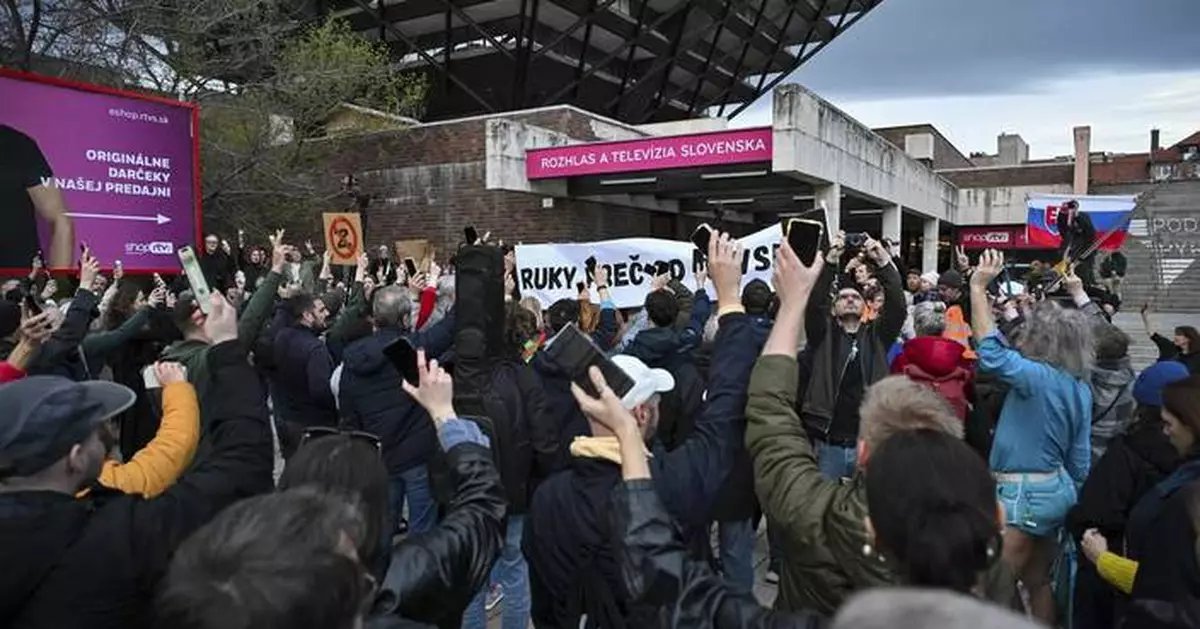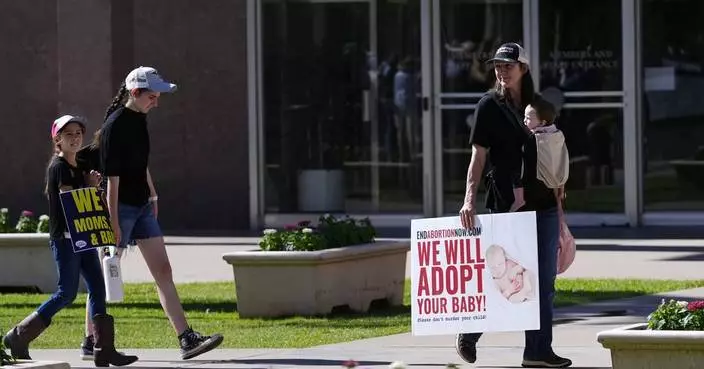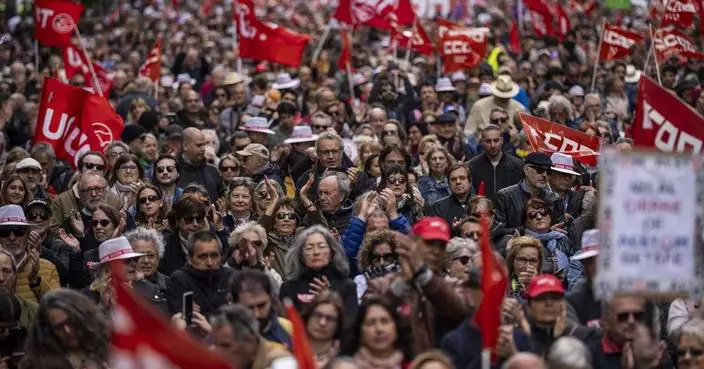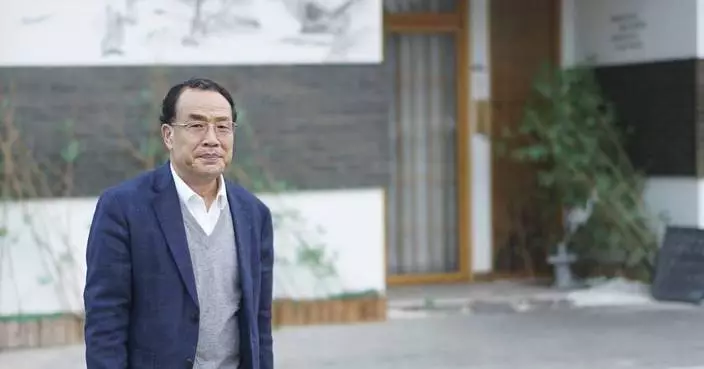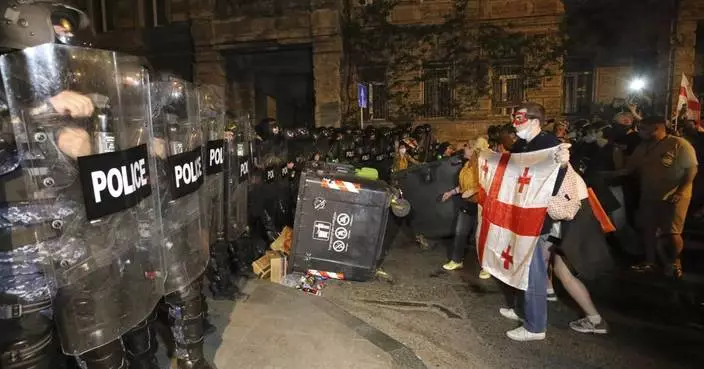BRATISLAVA, Slovakia (AP) — Protesters in Slovakia formed a human chain around the country's public television and radio building Wednesday in anger over a takeover plan by the government whose populist, pro-Russia prime minister recently labeled several private media outlets his enemies.
The takeover plan was drafted by Culture Minister Martina Šimkovičová, who represents an ultra-nationalist member party of the coalition government and has worked for an internet television outlet known for spreading disinformation.
The plan has been condemned by President Zuzana Čaputová, opposition parties, local journalists, international media organizations, the European Commission and others who warn that the government would be taking full control of public broadcasting. Slovak journalists have called the plan an attack on all free media.
Wednesday’s was the latest protest against the policies of Prime Minister Robert Fico, known for his tirades against journalists. His critics worry Slovakia under him will abandon its pro-Western course and follow the direction of Hungary under Prime Minister Viktor Orbán.
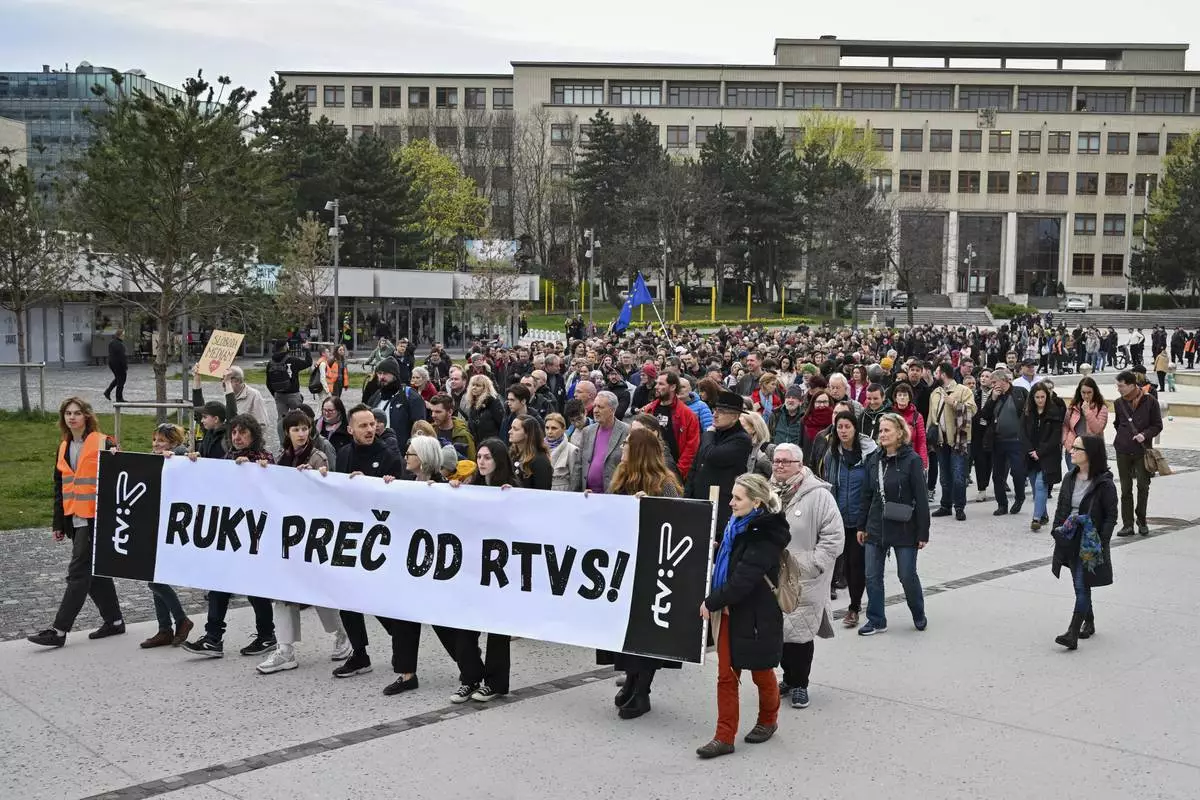
People hold a banner reading "Hands off rtvs (Slovakian public radio and tv) " as they take part in a protest organised by the Slovakian opposition parties in Bratislava, Wednesday, March. 27, 2024. People in Bratislava have formed a human chain around the building of Slovakia’s public radio and television to protest a plan by the government of populist Prime Minister Robert Fico to take over the broadcasters. The plan has been condemned President Zuzana Čaputová, opposition parties, local journalists, international media organizations, the European Commission and others have warned the changes would give the government’s full control of public broadcasting. (Pavol Zachar/TASR via AP)
Šimkovičová has said taking over public media is needed because she believes the current broadcaster is biased, giving space only to mainstream views and censoring the rest. The broadcaster has denied that.
According to her plan, the current public radio and television known as RTVS would be replaced by a new organization. A new seven-member council with members nominated by the government and parliament would select the broadcaster's director and have the right to fire the director without giving cause.
The current broadcaster's director was elected by parliament, and his term in office will end in 2027.
The hundreds of protesters unveiled a banner reading “HANDS OFF RTVS!” and chanted to local journalists, “We're by your side." Thousands of people rallied in a similar protest earlier this month.
Fico returned to power for the fourth time last year after his leftist party Smer (Direction) won the parliamentary election on a pro-Russian, anti-American platform.
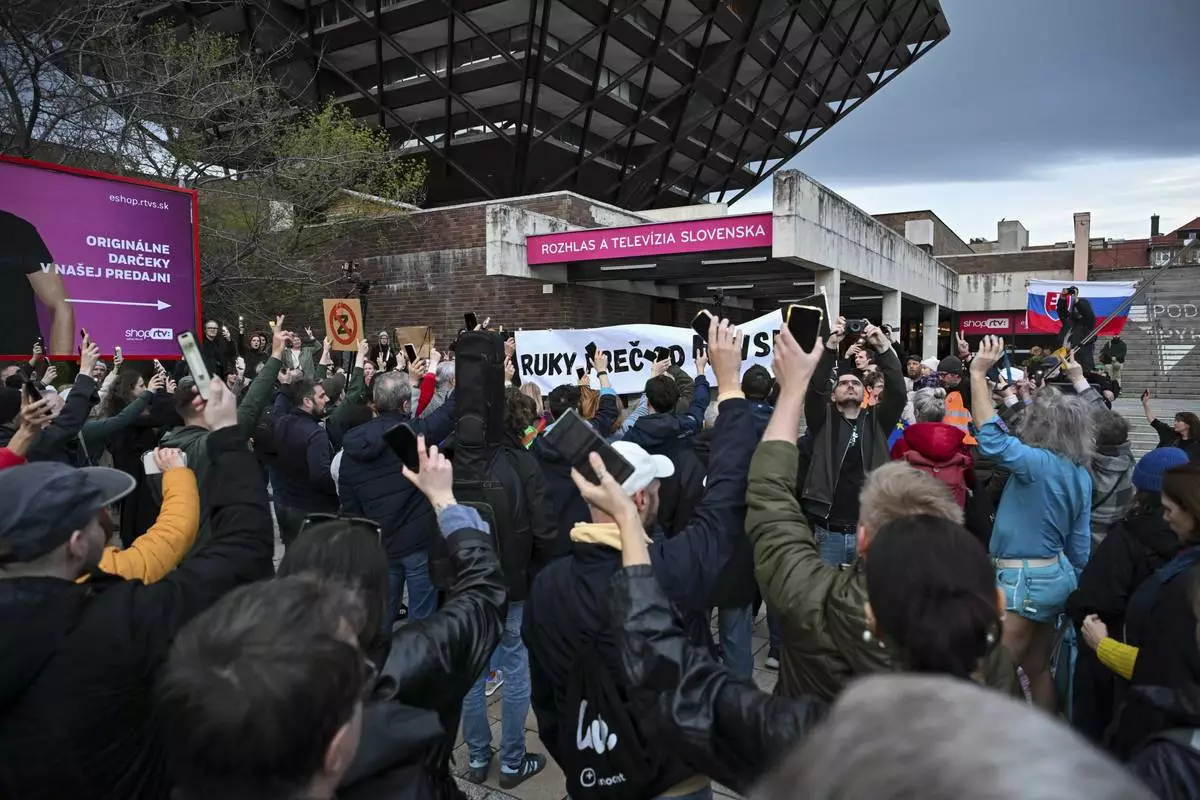
People take part in a protest organised by the Slovakian opposition parties in Bratislava, Wednesday, March. 27, 2024. People in Bratislava have formed a human chain around the building of Slovakia’s public radio and television to protest a plan by the government of populist Prime Minister Robert Fico to take over the broadcasters. The plan has been condemned President Zuzana Čaputová, opposition parties, local journalists, international media organizations, the European Commission and others have warned the changes would give the government’s full control of public broadcasting. (Pavol Zachar/TASR via AP)
TBILISI, Georgia (AP) — Georgia’s Parliament moved a step closer Wednesday to passing a law that critics fear will stifle media freedom and endanger the country’s European Union membership bid, as police used water cannons, tear gas and pepper spray against the tens of thousands of protesters who thronged surrounding streets.
Dozens of people were arrested the night before, and mass rallies have continued daily in the capital, Tbilisi. Protesters denounce the bill as “the Russian law” because neighboring Russia uses similar legislation to stigmatize independent news media and organizations critical of the Kremlin.
The law would require media and noncommercial organizations to register as “pursuing the interests of a foreign power,” if they receive more than 20% of funding from abroad. The ruling Georgian Dream party withdrew a similar proposal last year after large crowds protested.
Eighty-three of Georgia’s 150 lawmakers approved the bill in its second reading, while 23 voted against it. A third and final vote in Parliament is needed before it can be signed into law. Georgian lawmaker Irakli Kobakhidze told reporters on Wednesday that he expected that final vote to happen in mid-May.
Russia-Georgia relations have been complicated and turbulent since the Soviet Union’s collapse in the early 1990s. The two countries fought a short war in 2008 that ended with Georgia losing control of two Russia-friendly separatist regions.
In the aftermath, Tbilisi severed diplomatic ties with Moscow, and the issue of the regions’ status remains a key irritant, even as relations have somewhat improved.
Georgia joined international resolutions condemning Russia's full-scale invasion of Ukraine, but it also became a main destination for Russians fleeing military mobilization and political crackdowns. Even Georgia's ruling party has seen internal tensions over its neighbor.
The Interior Ministry said that 63 people were detained following Tuesday's protest.
Georgian television showed Levan Khabeishvili, chairman of the pro-West United National Movement party, arriving in Parliament on Wednesday morning with bandages on his nose and forehead. Members of Khabeishvili's party said that he had been assaulted by police during the protests.
Purple bruising and cuts were visible around Khabeishvili's left eye as he urged fellow lawmakers to scrap the bill.
“If you are not interested in how the leader of the main opposition party has been beaten up, then — for the sake of those young people who were injured, who were hit on the heads and bruised — I want to ask you once more, even though I do not have any hope, withdraw this law,” he said.
Deputy Interior Minister Aleksandre Darakhvelidze alleged at a briefing Wednesday that Khabeishvili broke through a police cordon the night before and was injured while he “resisted.” Darakhvelidze alleged that protesters and opposition leaders were “constantly committing violence.” Police broke up the protest after demonstrators tried to block entrances to Parliament.
As protesters gathered once more Wednesday, opposition lawmaker Beqa Liluashvili published a live video from the Parliament chamber showing lawmakers shouting and physically confronting each other. One threw a stack of papers at opponents. Others restrained colleagues.
Opposition lawmaker Helene Khoshtaria accused the ruling party of trying to “drag Georgia into Russian influence” and “close off its European future.”
Speaking to The Associated Press outside Parliament, she described authorities’ response to the rallies as “extremely authoritarian" but said it would not dissuade the protesters.
“We do not want the Soviet regime that our parents have experienced," one protester, Kato Salukvadze, told the AP late Tuesday. “I think that everyone should be in the streets and say no to the Russian law and yes to Europe."
Georgian President Salome Zourabichvili, increasingly at odds with the governing party, has criticized the bill and vowed to veto it if it is passed by Parliament. But the governing party can overrule the veto and ask the parliamentary speaker to sign the bill into law.
At a media briefing Wednesday, Kobakhidze spoke openly of Georgian Dream's intention to do so, and defended Tbilisi's forceful response to the protests.
“There will be demonstrations today, during the third reading, during the overriding of the veto. (When the law passes), there will be a few days of discomfort. However, in the long term, we will insure the country against polarization and radicalism for years," Kobakhidze told reporters.
EU foreign policy chief Josep Borrell said Wednesday on X, formerly Twitter, that Tbilisi's use of force against the demonstrators was “unacceptable.”
“Georgia is an EU candidate country, I call on its authorities to ensure the right to peaceful assembly,” he said.
The EU's foreign policy arm earlier this month also criticized Georgian Dream's decision to reintroduce the law, which it said “raises serious concerns” around media freedom in the country — something it called “crucial for the EU accession process.”
“Transparency should not be used as an instrument to limit civil society's capacity to operate freely,” the EU External Action Service said in a statement posted to its website on Apr. 4.
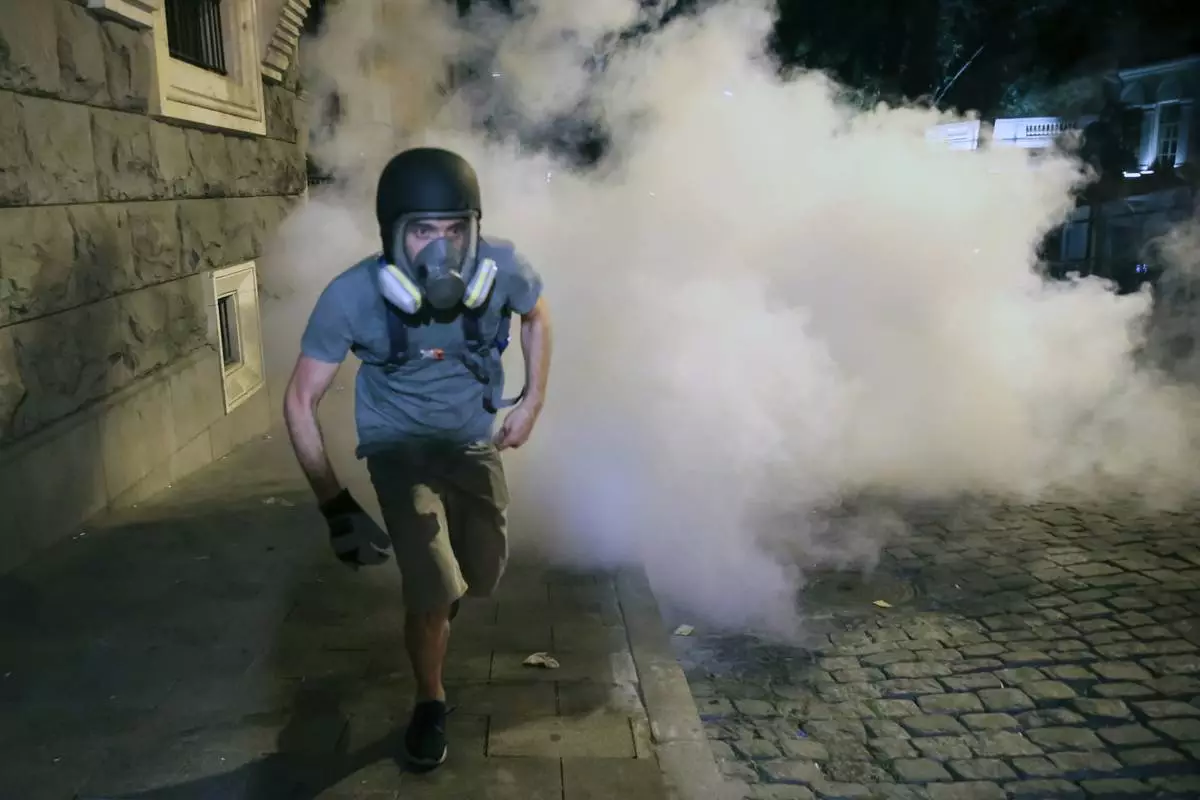
A demonstrator runs as police use tear gas during an opposition protest against "the Russian law" near the Parliament building in Tbilisi, Georgia, on Wednesday, May 1, 2024. Protesters denounce the bill as "the Russian law" because Moscow uses similar legislation to stigmatize independent news media and organizations critical of the Kremlin. (AP Photo/Zurab Tsertsvadze)
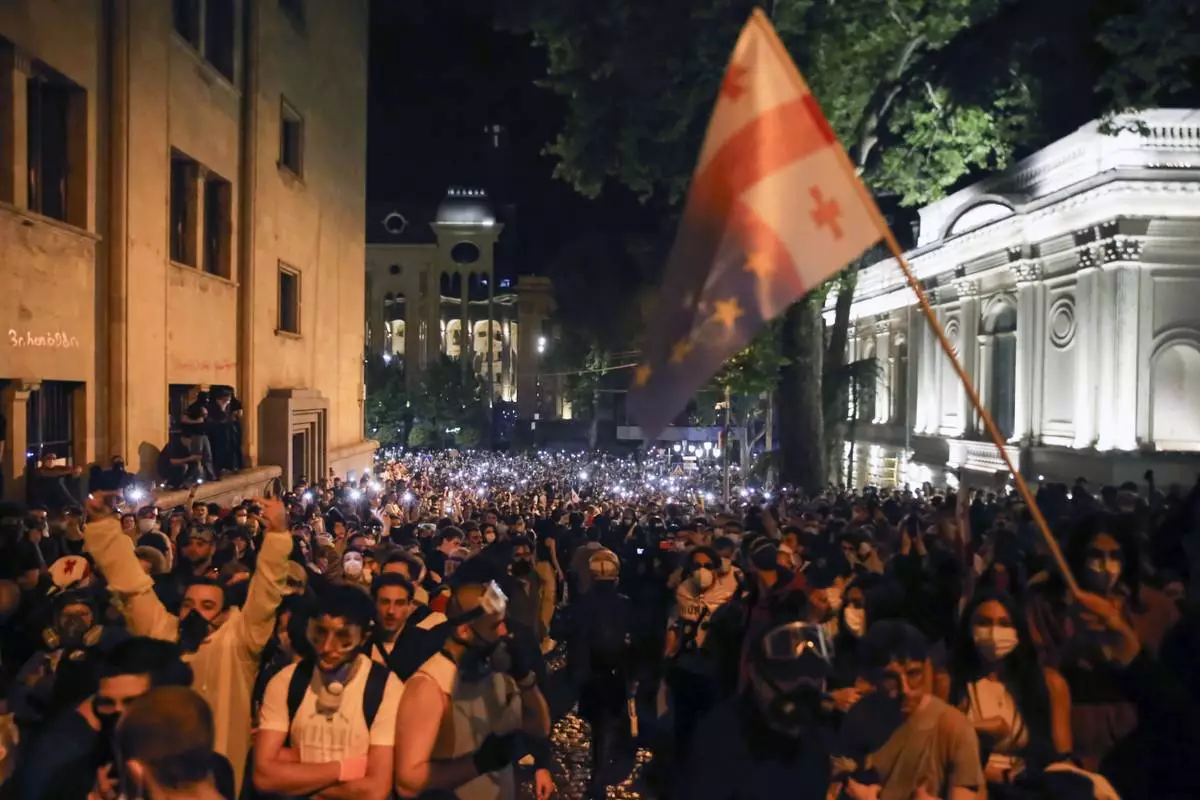
Demonstrators gather during an opposition protest against "the Russian law" near the Parliament building in Tbilisi, Georgia, early Thursday, May 2, 2024. Protesters denounce the bill as "the Russian law" because Moscow uses similar legislation to stigmatize independent news media and organizations critical of the Kremlin. (AP Photo/Zurab Tsertsvadze)
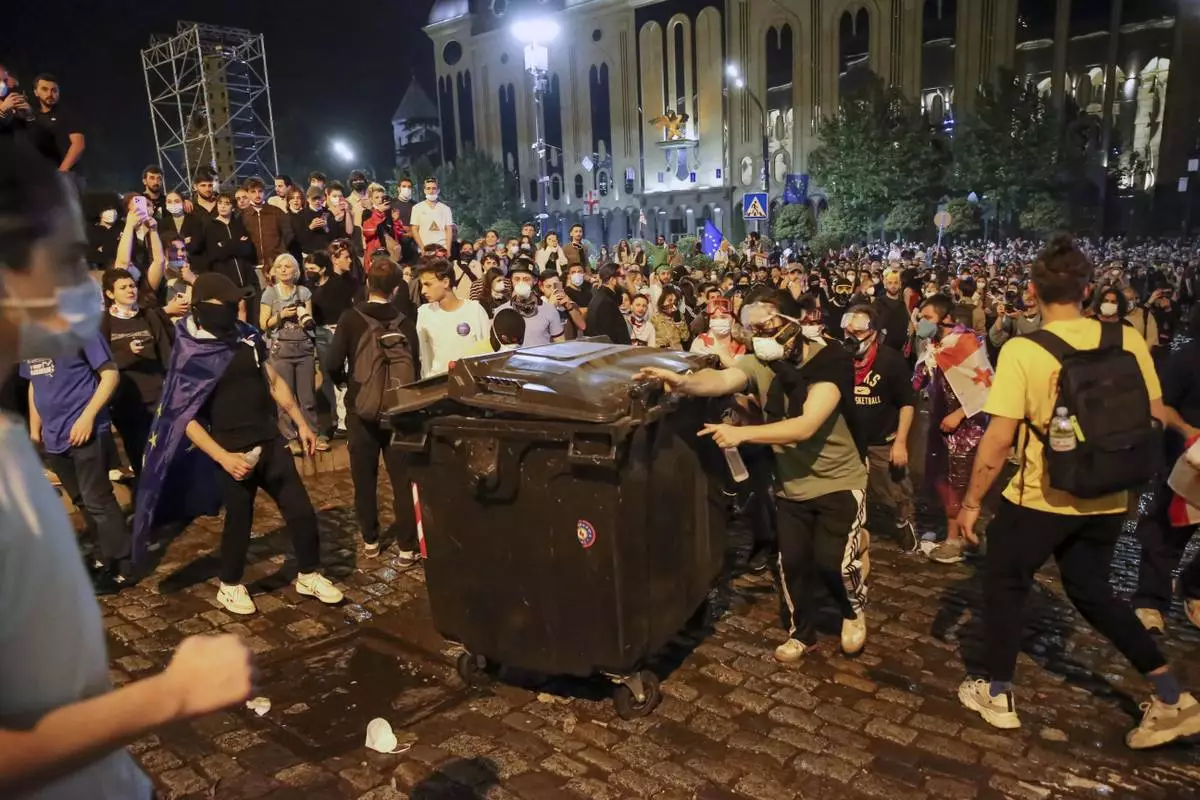
Demonstrators build a barricade during an opposition protest against "the Russian law" near the Parliament building in Tbilisi, Georgia, early Thursday, May 2, 2024. Protesters denounce the bill as "the Russian law" because Moscow uses similar legislation to stigmatize independent news media and organizations critical of the Kremlin. (AP Photo/Zurab Tsertsvadze)
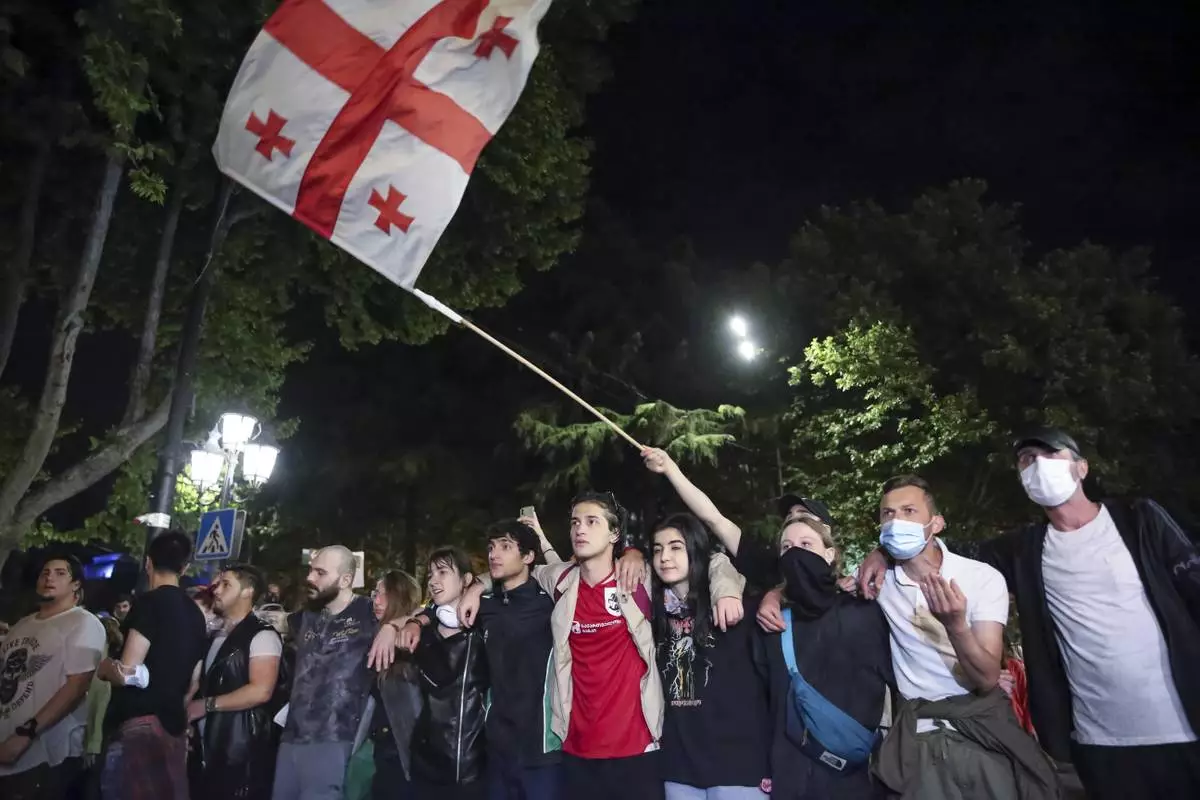
Demonstrators wave a Georgian national flag standing in front of police block during an opposition protest against a bill near the Parliament building in Tbilisi, Georgia, on Thursday, May 2, 2024. Protesters denounce the bill as "the Russian law" because Moscow uses similar legislation to stigmatize independent news media and organizations critical of the Kremlin. (AP Photo/Zurab Tsertsvadze)

Police use water cannons and tear gas against demonstrators during an opposition protest against "the Russian law" near the Parliament building in Tbilisi, Georgia, on Wednesday, May 1, 2024. Protesters denounce the bill as "the Russian law" because Moscow uses similar legislation to stigmatize independent news media and organizations critical of the Kremlin. (AP Photo/Zurab Tsertsvadze)
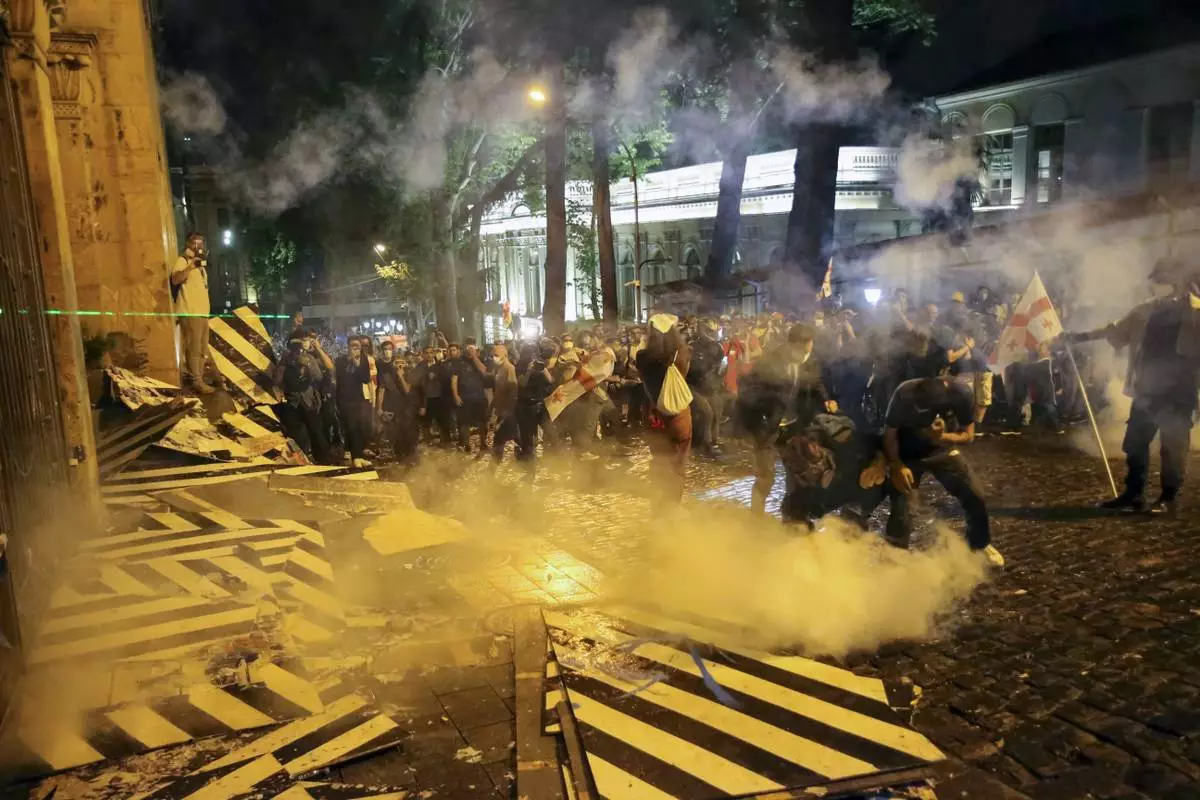
Police use tear gas against demonstrators during an opposition protest against "the Russian law" near the Parliament building in Tbilisi, Georgia, on Wednesday, May 1, 2024. Protesters denounce the bill as "the Russian law" because Moscow uses similar legislation to stigmatize independent news media and organizations critical of the Kremlin. (AP Photo/Zurab Tsertsvadze)

A demonstrator gestures while arguing with the police during an opposition protest against "the Russian law" near the Parliament building in Tbilisi, Georgia, on Wednesday, May 1, 2024. Protesters denounce the bill as "the Russian law" because Moscow uses similar legislation to stigmatize independent news media and organizations critical of the Kremlin. (AP Photo/Zurab Tsertsvadze)

Demonstrators wave Georgian national flag during an opposition protest against "the Russian law" near the Parliament building in Tbilisi, Georgia, on Wednesday, May 1, 2024. Protesters denounce the bill as "the Russian law" because Moscow uses similar legislation to stigmatize independent news media and organizations critical of the Kremlin. (AP Photo/Zurab Tsertsvadze)

Demonstrators argue with police that blocked them during an opposition protest against "the Russian law" near the Parliament building in Tbilisi, Georgia, on Wednesday, May 1, 2024. Protesters denounce the bill as "the Russian law" because Moscow uses similar legislation to stigmatize independent news media and organizations critical of the Kremlin. (AP Photo/Zurab Tsertsvadze)

Demonstrators blocked by the police wave a EU flag during an opposition protest against "the Russian law" near the Parliament building in Tbilisi, Georgia, on Wednesday, May 1, 2024. Protesters denounce the bill as "the Russian law" because Moscow uses similar legislation to stigmatize independent news media and organizations critical of the Kremlin. (AP Photo/Zurab Tsertsvadze)

Police face demonstrators during an opposition protest against "the Russian law" near the Parliament building in Tbilisi, Georgia, on Wednesday, May 1, 2024. Protesters denounce the bill as "the Russian law" because Moscow uses similar legislation to stigmatize independent news media and organizations critical of the Kremlin. (AP Photo/Zurab Tsertsvadze)

A woman shows a heart standing in front of riot police during an opposition protest against "the Russian law" near the Parliament building in Tbilisi, Georgia, on Wednesday, May 1, 2024. Clashes erupted between police and opposition demonstrators protesting a new bill intended to track foreign influence that the opposition denounced as Russia-inspired. (AP Photo/Zurab Tsertsvadze)
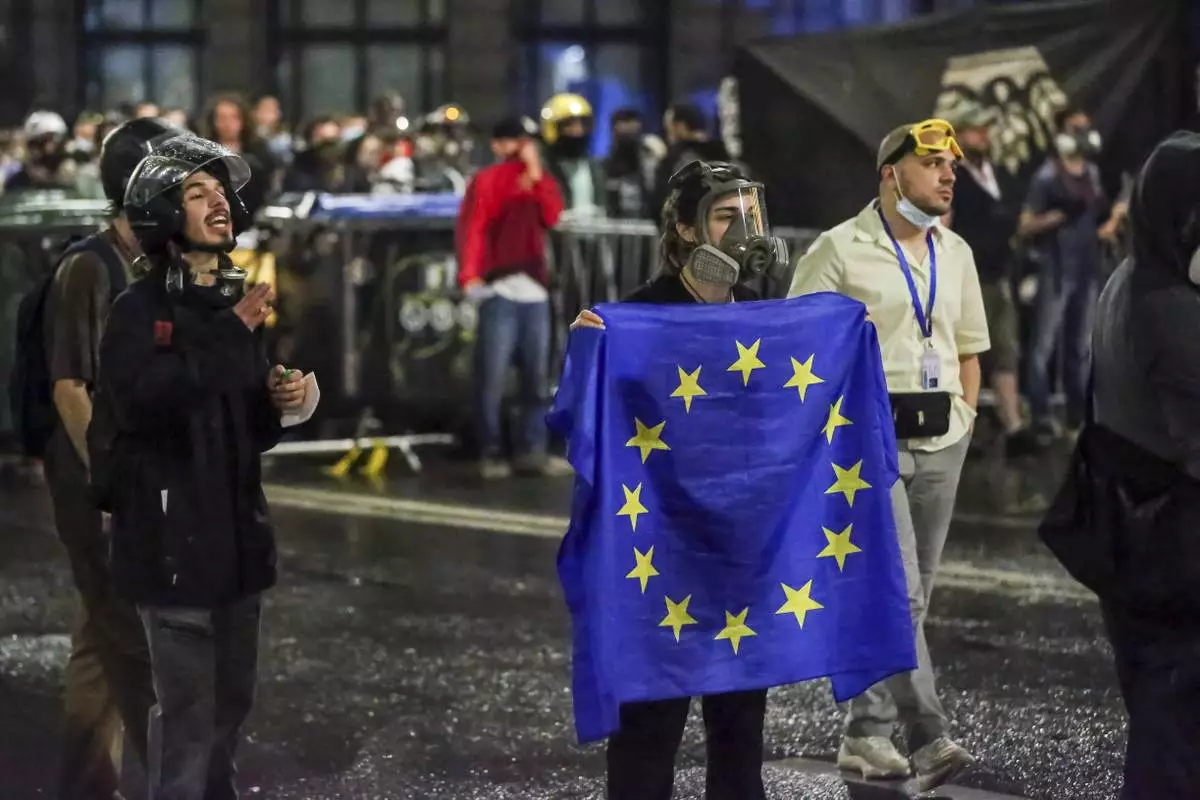
A demonstrator stands with a EU flag in front of police block during an opposition protest against "the Russian law" near the Parliament building in Tbilisi, Georgia, on Wednesday, May 1, 2024. Clashes erupted between police and opposition demonstrators protesting a new bill intended to track foreign influence that the opposition denounced as Russia-inspired. (AP Photo/Zurab Tsertsvadze)
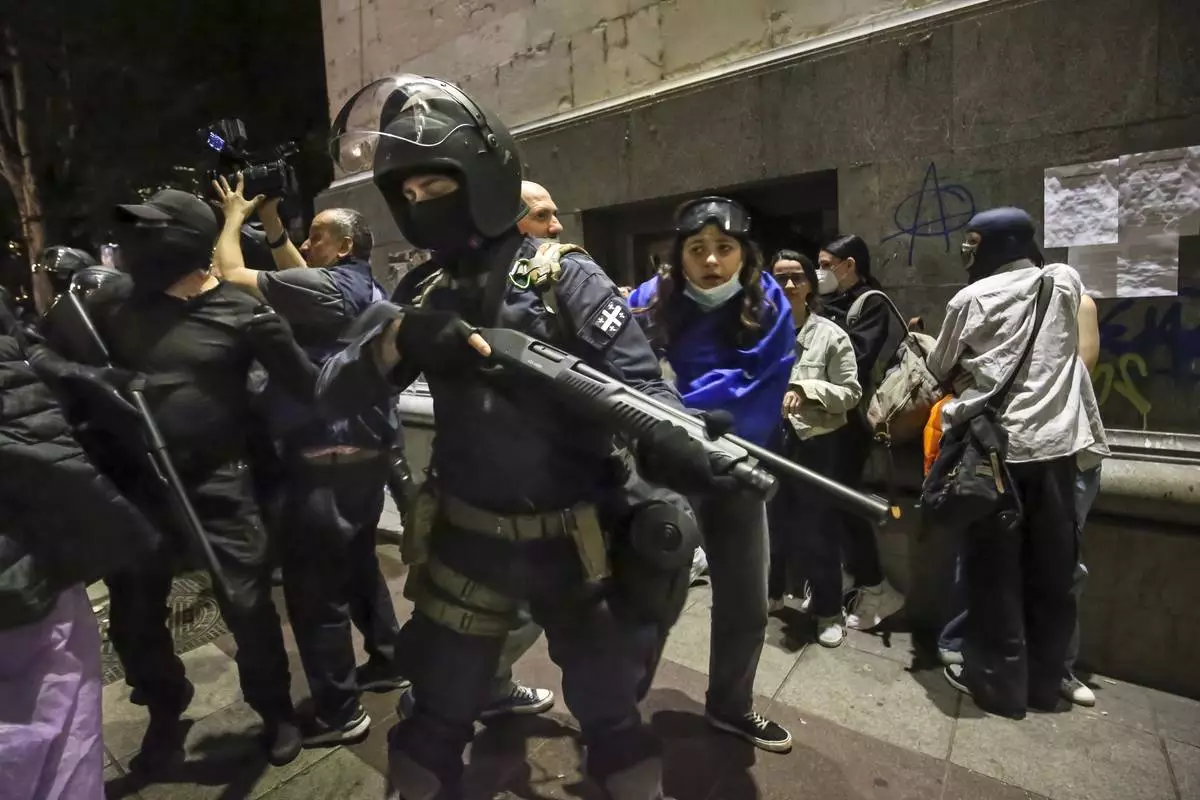
Riot policemen stand ready to fire gas grenade during an opposition protest against "the Russian law" near the Parliament building in Tbilisi, Georgia, on Wednesday, May 1, 2024. Clashes erupted between police and opposition demonstrators protesting a new bill intended to track foreign influence that the opposition denounced as Russia-inspired. (AP Photo/Zurab Tsertsvadze)
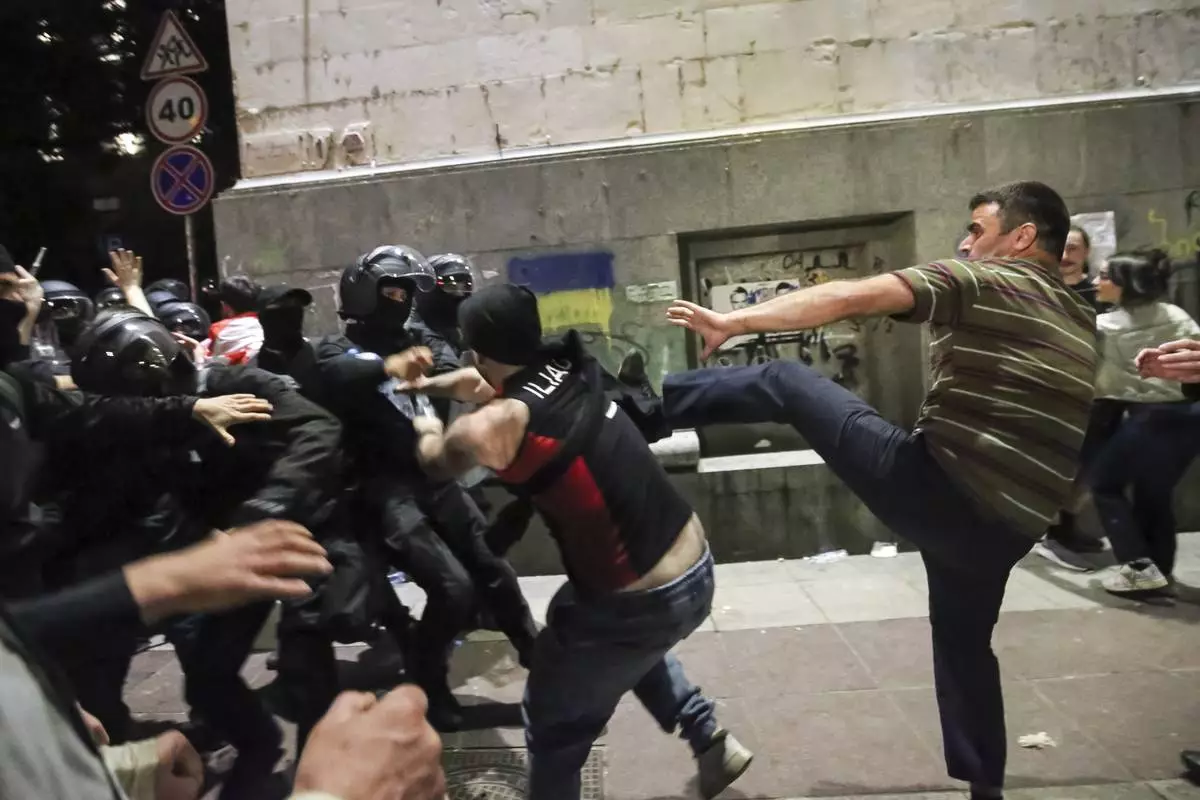
Demonstrators scuffle with riot police during an opposition protest against "the Russian law" near the Parliament building in Tbilisi, Georgia, on Wednesday, May 1, 2024. Clashes erupted between police and opposition demonstrators protesting a new bill intended to track foreign influence that the opposition denounced as Russia-inspired. (AP Photo/Zurab Tsertsvadze)
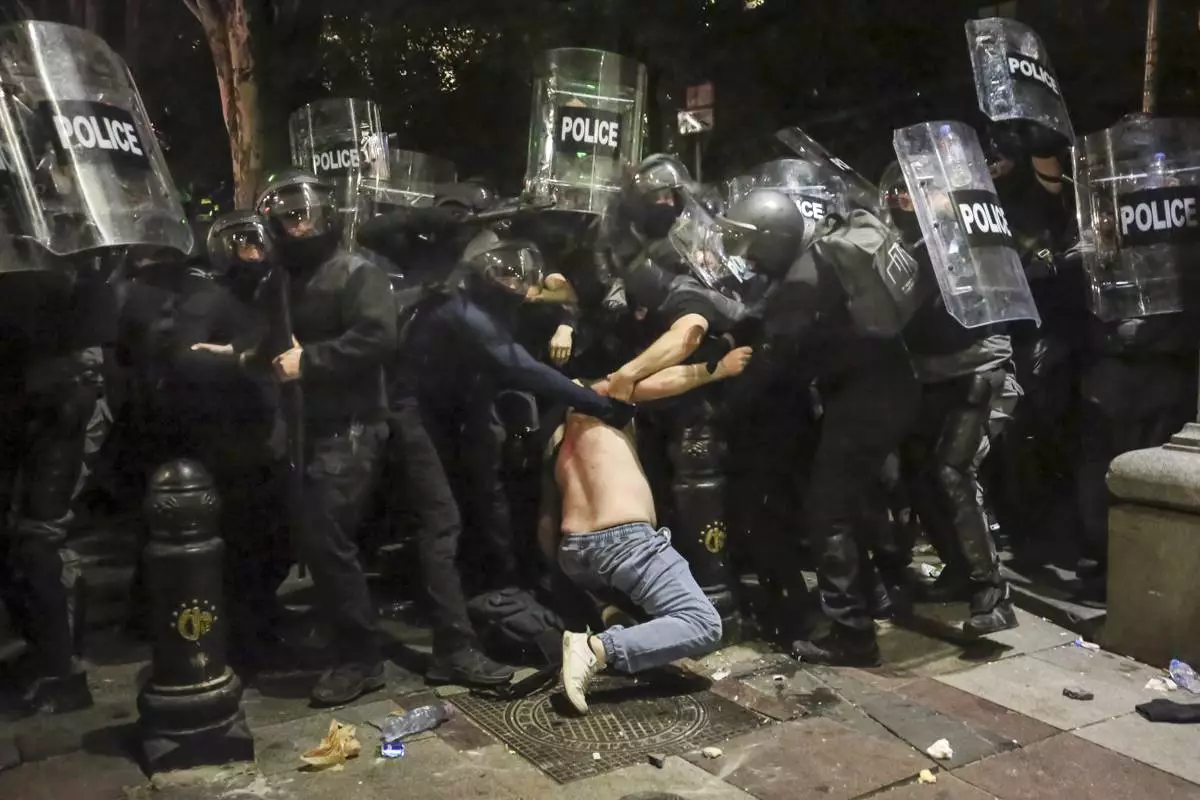
Riot police detain a demonstrator during an opposition protest against "the Russian law" near the Parliament building in Tbilisi, Georgia, on Wednesday, May 1, 2024. Clashes erupted between police and opposition demonstrators protesting a new bill intended to track foreign influence that the opposition denounced as Russia-inspired. (AP Photo/Zurab Tsertsvadze)
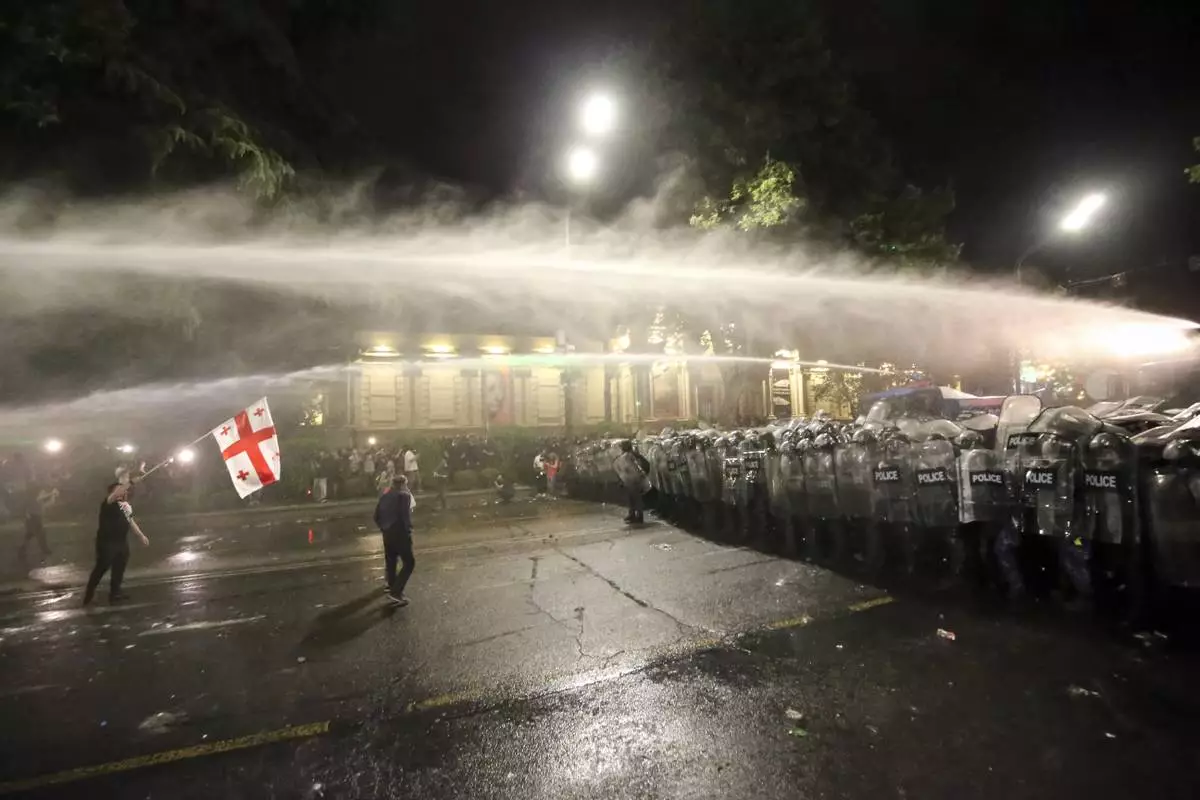
Riot police use a water cannon during an opposition protest against "the Russian law" near the Parliament building in Tbilisi, Georgia, on Wednesday, May 1, 2024. Clashes erupted between police and opposition demonstrators protesting a new bill intended to track foreign influence that the opposition denounced as Russia-inspired. (AP Photo/Zurab Tsertsvadze)
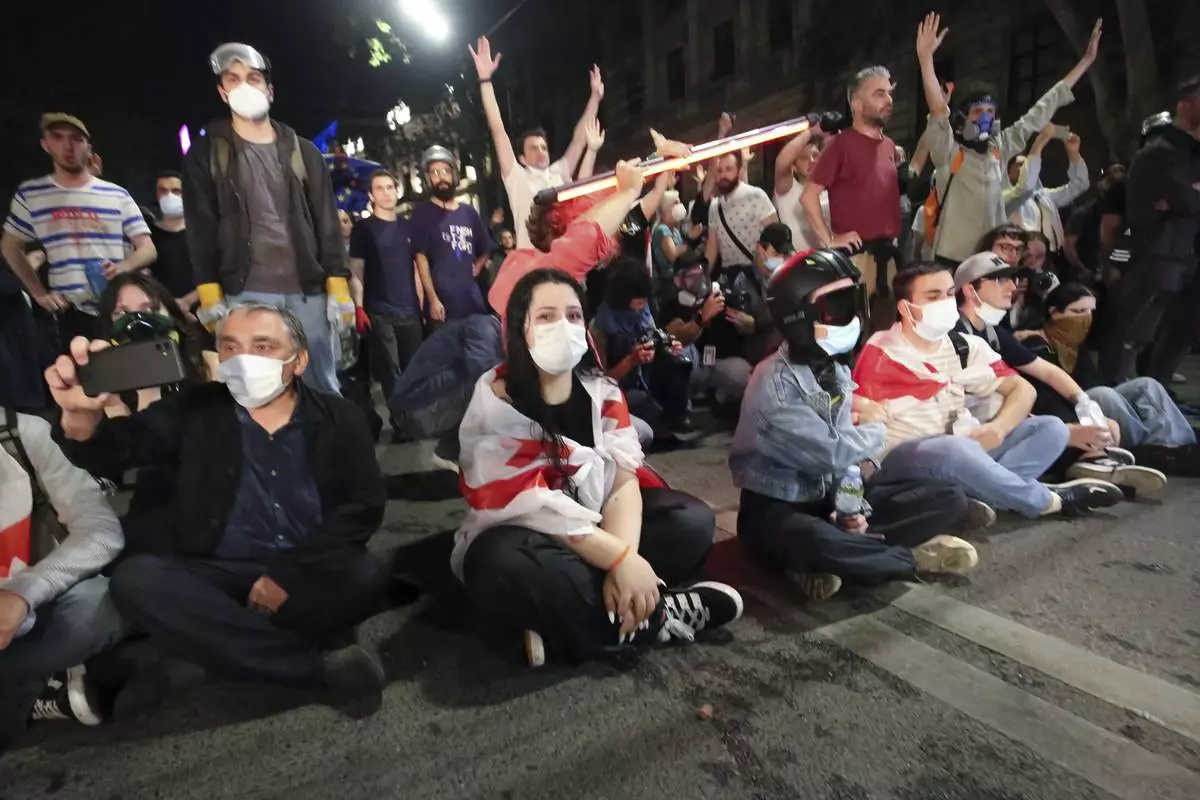
Demonstrators sit in front of police line during an opposition protest against "the Russian law" near the Parliament building in Tbilisi, Georgia, on Tuesday, April 30, 2024. Clashes erupted between police and opposition demonstrators protesting a new bill intended to track foreign influence that the opposition denounced as Russia-inspired. (AP Photo/Zurab Tsertsvadze)




